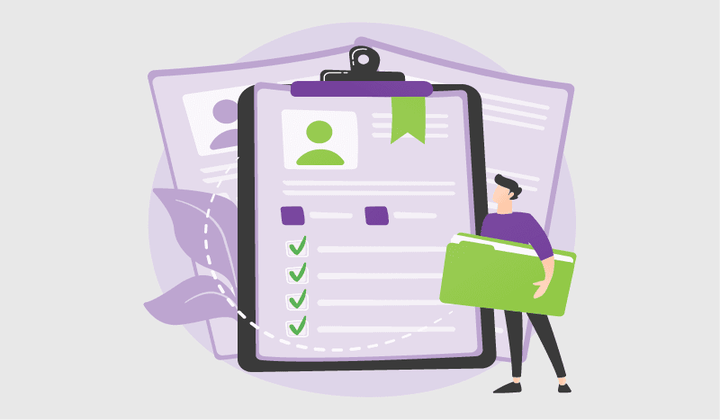In this post
How to Write a Resume with No Experience

Are you looking for your first job in high school, or entering the workforce for the first time? Here’s exactly how to write a compelling resume as a high school student without any work experience.
The catch-22 of applying for jobs as a young person is that in order to score a job, you need experience, but in order to get experience, you need to have had a job! Follow the points in this resume template to craft the perfect resume and get closer to landing your first job, even as a young person with minimal experience.
Use a personal statement
While personal summaries or statements at the top of your resume aren’t necessary, they can help to add substance to a beginner’s resume. Your personal statement allows you to talk about your long-term career goals, and assert your enthusiasm and suitability for the role.
Highlight your attitude and personality
Noticed how so many job descriptions talk about having a positive attitude or a strong work ethic or being a team player? That’s because these traits are universally tied to being a fantastic employee. Hiring managers are often looking for someone with a great personality that they can then train up in the relevant skills.
Use your resume and cover letter to shine a light on the personality traits that would make you a great coworker and employee. This could be by including personal achievements that illustrate your drive and willingness.
Emphasise your transferable skills
When it comes to entry-level roles, recruiters and hiring managers tend to focus on the skills that make you a good all-rounder. Again, specific skills can often be learned on the job. Use the skills section of your resume to list skills like time management or problem-solving, which you’ve probably already developed through completing assignments and meeting deadlines at school. Other great skills to highlight as a young job seeker are organisational skills, the ability to multitask, or hands-on experience with IT, and soft skills like being a strong communicator and a people person.
Make a personal connection
You’ve probably heard that when it comes to the job search, it’s not what you know, it’s who you know. A good strategy when applying for your first job is to call the recruiter or hiring manager to simply have a conversation about the job posting. If getting on the phone with someone isn’t possible, try researching the relevant point of contact on LinkedIn so that you’ll be able to have a personable conversation with them if you do get called into an interview.
Find examples of relevant experience
Of course, the biggest dilemma young people have when writing their first resume is figuring out what to include in the experience section of their resumes when they don’t have traditional work experience. But when you dig deep, you’ll realise that you do have plenty of life experience to draw on. This could be:
- Informal jobs you’ve worked like mowing the lawn for a neighbour or babysitting for a family member
- Completing extracurricular activities at school or through a sports club
- Completing an internship or apprenticeship
- Participating in volunteer work
- Any relevant coursework, especially if it involved leading a team or a project, or if the subject you studied relates to the job you are applying for
Use a solid resume template
Following a pre-made resume format will help you create a more professional resume, despite not yet having industry experience. Utilise bullet points, check for typos, include your contact information and use a resume template to properly structure your application. Presenting your resume in a professional way can help you look more experienced than you are, and ensure that the automated applicant tracking systems recruiters often use won’t miss any vital info in your application.
With the above tips, there’s no reason your lack of professional experience will hold you back from scoring a stellar job!
Get started with a resume template
Using a resume template will help you properly structure the information on your resume, and make your resume appear more professional.
Latest Articles
Agriculture Careers: What You Should Know in 2025
As one of Australia's most important industries, the agriculture industry offers great career opport...
Are Digital Skills the Key to Job Security in 2025?
The digital revolution is here, and it doesn’t care if you have a technical job or not — it’s coming...
How to Become a Chef in Australia: Complete Guide for 2025
The complete guide to becoming a chef in Australia. Learn how to get your start and make it in the h...
Want to read more?
5 Reasons to Consider a Career Change into Technology
With a wide array of careers to choose from, why might you consider a career in Technology? Here’s t...
How To Grow Your Accounting Skills In 5 Simple Steps
Improve your accounting skills with 5 actionable steps from CPA exam mentor Bryan Kesler, and take y...
The Best Counselling Fields to Specialise in to Get a Job
There are a wide range of specialisations within the counselling industry. Find out which provides t...
